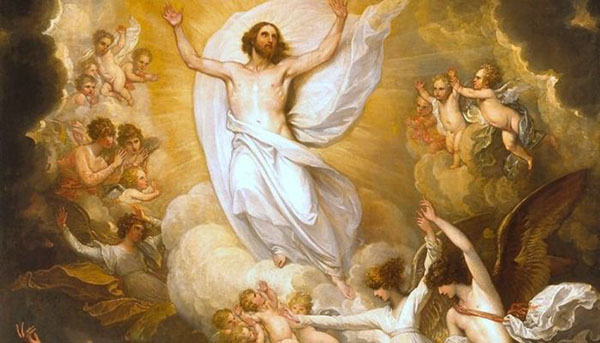Guide to the study of the biblical history of the Ascension of Jesus

The ascension of Jesus describes the transition of Christ from earth to heaven after his life, ministry, death and resurrection. The Bible refers to ascension as a passive action: Jesus was "brought" to heaven.
Through the ascension of Jesus, God the Father has exalted the Lord to his right hand in heaven. More importantly, on his ascension, Jesus promised his followers that he would soon pour out the Holy Spirit on them and in them.
Question for reflection
The ascension of Jesus into heaven allowed the Holy Spirit to come and fill His followers. It is a majestic truth to realize that God himself, in the form of the Holy Spirit, lives within me as a believer. Am I taking full advantage of this gift to learn more about Jesus and to live a life pleasing to God?
Scripture references
The ascension of Jesus Christ to heaven is recorded in:
Mark 16: 19-20
Luke 24: 36-53
Acts 1: 6-12
1 Timoteo 3: 16
The summary of the story of the Ascension of Jesus
In God's plan of salvation, Jesus Christ was crucified for the sins of humanity, died and rose from the dead. After his resurrection, he appeared many times to his disciples.
Forty days after his resurrection, Jesus called his 11 apostles together on the Mount of Olives outside Jerusalem. Still not fully understanding that Christ's messianic mission had been spiritual and non-political, the disciples asked Jesus if he would restore the kingdom in Israel. They were frustrated by Roman oppression and may have imagined an overthrow of Rome. Jesus answered them:
It is not for you to know the times or dates that the Father has set by his own authority. But you will receive power when the Holy Spirit comes upon you; and you will be my witnesses in Jerusalem, throughout Judea and Samaria and to the ends of the earth. (Acts 1: 7-8, NIV)
Jesus rising to heaven
Jesus ascending to heaven, Ascension of John Singleton Copley (1738-1815). Public domain
Then Jesus was taken and a cloud hid him from their sight. As the disciples watched him go up, two angels dressed in white robes stood beside them and asked why they were looking up to heaven. The angels said:
This same Jesus, who was brought to you in heaven, will return in the same way you saw him go to heaven. (Acts 1:11, NIV)
At that point, the disciples returned to Jerusalem in the upstairs room where they were staying and holding a prayer meeting.
Points of interest
The ascension of Jesus is one of the accepted doctrines of Christianity. The Creed of the Apostles, the Creed of Nicea and the Creed of Athanasius all confess that Christ has risen to heaven and sits at the right hand of God the Father.
During Jesus' ascension, a cloud obscured him from view. In the Bible, a cloud is often an expression of the power and glory of God, as in the book of Exodus, when a pillar of cloud led the Jews into the desert.
The Old Testament records two other human ascensions in the lives of Enoch (Genesis 5:24) and Elijah (2 Kings 2: 1–2).
The ascension of Jesus allowed eyewitnesses to see both the risen Christ on earth and the victorious, eternal King who returned to heaven to rule on his throne at the right hand of God the Father forever. The event is another example of Jesus Christ bridging the gap between human and divine.
Life lessons
Earlier, Jesus had told his disciples that after ascending, the Holy Spirit would descend on them with power. At Pentecost, they received the Holy Spirit as tongues of fire. Today every new born believer is inhabited by the Holy Spirit, who gives wisdom and power to live the Christian life.
Pentecost.jpg
The apostles receive the gift of tongues (Acts 2). Public domain
Jesus' command to his followers was to be his witnesses in Jerusalem, Judea, Samaria and the ends of the earth. The Gospel spread first to the Jews, then to the Jewish / mixed-race Samaritans, then to the Gentiles. Christians have a responsibility to spread the good news of Jesus to all those who have not listened.
Through ascension, Jesus returned to heaven to become a believer's lawyer and intercessor at the right hand of God the Father (Romans 8:34; 1 John 2: 1; Hebrews. 7:25). His mission on earth had been accomplished. He has taken on a human body and will forever remain both fully God and fully man in his glorified state. The work done for Christ's sacrifice (Hebrews 10: 9–18) and his replacement atonement is complete.
Jesus is now and forever exalted above all creation, worthy of our worship and obedience (Philippians 2: 9-11). Ascension was Jesus' last step in defeating death, making eternal life possible (Hebrews 6: 19–20).
The angels have warned that one day Jesus will return to his glorified body, in the same way he left. But instead of looking idly at the Second Coming, we should be busy with the work that Christ has assigned to us.